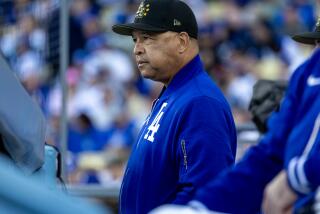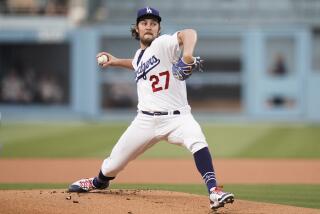Players Caught in a Safety Squeeze
Major league security is tighter than ever. At Dodger Stadium, for instance, reporters have to sign in when they enter the ballpark on the top level and again when they enter the press box, go on the field and enter either clubhouse both before and after games--when the clock is ticking on deadlines.
If tiresome, it’s also true that you can never be too safe when journalists are involved.
However, even players are affected.
A directive from the commissioner’s office restricts access to team facilities such as the clubhouse to players, union and baseball officials, uniformed personnel, team trainers, doctors, media and other essential team employees such as clubhouse attendants and equipment managers.
Two of baseball’s top players, Jason Giambi and Barry Bonds, have been directly affected. Each travels with a personal trainer--Bonds, in fact, has two--and personal trainers do not have clubhouse access under the directive.
The Yankees have circumvented the directive by hiring Bob Alejo, the former Oakland A’s weight coach whom Giambi is paying $125,000 a year to serve as fitness guru, as a batting practice pitcher and will pay him on a per-diem basis.
“Jason is committed to being the best he can possibly be in New York, and he asked us to try to help him be the best he can be,” Yankee General Manager Brian Cashman said. “It would be foolish of me not to try and assist.”
Scott Boras, who represents Bonds and several other players--including Alex Rodriguez and Gary Sheffield--who have “invested in their careers” by hiring personal trainers, said security is essential and that the clubhouse is not a place for “a wide variety of friends, relatives and agents.”
However, Boras said, it shouldn’t be necessary for clubs to “conduct a charade” in which they give a phony title to a personal trainer and pay him “a dollar a month” so he can have clubhouse access.
“Players are encouraged to maintain an optimum level of conditioning and performance,” Boras said. “To set up a system that discourages that is not in the best interest of the game. Instead of sending out an arbitrary directive without advance notice, there should be a way to resolve both dynamics [of security and access for personal trainers]. The Giants have assured us that they’ll work with Barry so that he can continue his program.”
*
In and Out
Jeff Kent returned to the San Francisco lineup Saturday, but it could be construed as the beginning of the end for Kent with the Giants.
The National League’s most valuable player in 2000 is eligible for free agency in November and the Giants have little, if any, interest in re-signing him.
Sources say club officials are fed up with Kent’s ongoing cover-up as to how he broke his wrist March 1.
In embarrassing himself and the club, Kent initially said he broke it when he fell off his truck while washing it.
The Giants are convinced he broke it when he fell off his motorcycle while doing high-speed wheelies on a busy street in Scottsdale, Ariz., an activity violating his contract.
“If this was a court case, the Giants clearly have enough evidence to indict,” said a person familiar with the situation.
General Manager Brian Sabean let his emotions show in Los Angeles when Kent complained about opening the season on the disabled list.
Sabean said he was “up to here” with Kent and added, “he should have thought more about his actions that put him and the club in this position. I didn’t break his wrist. What I say is, ‘Tough luck.’ Quote, unquote.”
*
Desperation
In his ongoing rehabilitation from a slight tear and fraying in his rotator cuff, Pedro Martinez returns to the mound today after his disappointing performance--nine hits, seven earned runs in three-plus innings--in the Boston Red Sox opener.
Martinez is so confused by the uncertainty he is experiencing that he told Boston reporters, “You could even give me advice and I would probably listen. I’m a rookie at this. I’ve never been hurt. Who knows how long it’s going to take me? All I can do is just go out there and wonder.”
In reality, Martinez has been through the rehabilitation process before, but that was when he was still in the Dodgers’ minor league system, and the surgery performed by Dr. Frank Jobe to repair a separated shoulder involved his left or non-pitching shoulder.
Jobe, however, conceded in a 1999 interview with The Times that questions pertaining to Martinez’s stature, stamina and shoulder stability led him to point out those possible physical pitfalls--as most doctors would--before Fred Claire and Tom Lasorda made the now-infamous decision to trade Martinez to Montreal for
Delino DeShields
“I don’t think I said, ‘Get rid of him,’” Jobe said in the interview. “I’d never say that, but the circumstances kind of spoke for themselves. He had a delicate stature to start with, and there were obviously questions about his stamina. It’s a judgment call, but you had to kind of wonder, ‘Golly, is this kid going to break down?’”
The breakdown came after two Cy Young awards and five-plus seasons of never missing a start. As Jobe also said in that 1999 interview, referring to Pedro and brother Ramon, “They may have [physical drawbacks], but they’re tough people.”
*
The Spokesman
The players’ union was undoubtedly delighted to see Forbes magazine rip management’s financial figures and portrait of doom and gloom. If union executives bit their tongues, however, Minnesota Twin infielder and player representative Denny Hocking may have spoken for them.
In voicing the union view, Hocking began taking shots at Commissioner Bud Selig in the off-season, and after Selig criticized the Forbes report, Hocking said, “Gee, should I believe a magazine that spends 365 days a year researching finances, or someone who has zero credibility?”
*
Ross Newhan
More to Read
Go beyond the scoreboard
Get the latest on L.A.'s teams in the daily Sports Report newsletter.
You may occasionally receive promotional content from the Los Angeles Times.










